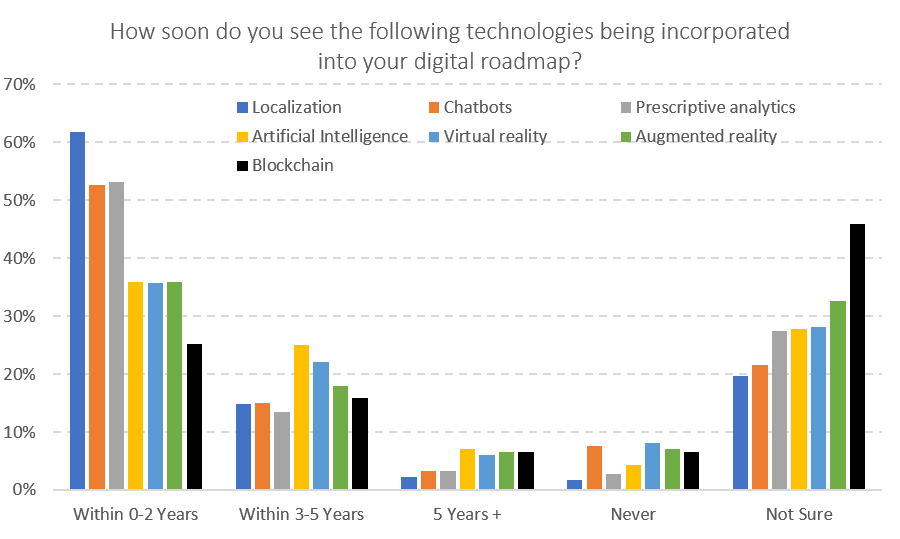Travel Startups Work With Breakthrough Technologies That Could Threaten Industry Leaders

Skift Take
Venture capital companies invested a record amount of money — $5.3 billion — in travel startups in 2017. In its latest report, Skift Research analyzes the rapidly evolving market for travel startups and their venture capital backers.
Breakthroughs in artificial intelligence, blockchain, virtual reality, and other technologies threaten to pressure and even unseat long-time incumbents. However, startups working in these areas often face challenges both in commercializing their tech and in convincing a sometimes-skeptical audience.
Startup founders in these emerging technology fields should work on bridging the knowledge gap, ensuring that there is real value in their products and services, and then attempting to get C-Suite buy-in at larger corporations.
Last week we launched the latest report in our Skift Research service, Venture Investment Trends and Startup Opportunities in Travel 2018.
Below is an excerpt from our Skift Research Report. Get the full report here to stay ahead of this trend.
Skift’s state of startups survey asked which technology was likely to be most disruptive to the travel industry.
Artificial Intelligence and the closely related field of machine learning/predictive analytics topped the list. These technologies continue to advance and are poised to disrupt a wide range of industries.
Going to the source: where startups see the greatest technology potential

Source: Skift + Amadeus State of Travel Startups Survey
Preview and Buy the Full Report
Close behind was blockchain technology, which has been the spotlight this year as the technology underpinning for virtual currencies like bitcoin. However, we expect that much of the true innovation will come not from the currency itself but from the protocol’s ability to decentralize areas such as distribution and contracts. Legacy IT systems could be left behind if they don't adapt.
Bonny Simi, president of JetBlue Technology Ventures, agrees. She sees potential from distributed databases and smart contracts around payments, distribution, and loyalty systems. A smart contract is a self-executing, self-enforcing contract embedded in software. In this context, a smart contract could perhaps be used for programming automatic settlements.
Virtual and augmented reality also had a strong showing in our survey and are likely to play a large future role in travel. Erik Blachford, venture partner at TCV and former CEO of Expedia, observes that no one has yet “figured out how to integrate … higher-order functions [like virtual and augmented reality] into the travel experience.”
Despite the potential of augmented reality and virtual reality technologies, many established players indicate that implementation is not on their current roadmaps.
What will be key here, as with all new tech, said Simi, is a continued effort to bridge the cultures of new companies and legacy giants. “It’s hard for them to grasp a new economy and new ways,” she said, regarding organizations that have been in the industry for decades and rely on older technology.
Preview and Buy the Full Report
Despite the potential of augmented reality, virtual reality, blockchain, and voice-based search, for that matter, the success of these technologies and the startups going to market with them is far from a foregone conclusion. We find that many travel executives are hesitant about their potential. For instance, almost half of those we polled were not sure when, if ever, they would incorporate blockchain into their business models. Yet, just seven percent said that they would “never” integrate blockchain into their tech stacks. We believe that most are waiting to see a stronger use case for these new products before committing.
The travel tech roadmap: executives most uncertain about blockchain, VR/AR

Source: Skift Research
Subscribe now to Skift Research Reports
This is the latest in a series of research reports, analyst calls, and data sheets aimed at analyzing the fault lines of disruption in travel. These reports are intended for the busy travel industry decision maker. Tap into the opinions and insights of our seasoned network of staffers and contributors. Over 200 hours of desk research, data collection, and/or analysis goes into each report.
After you subscribe, you will gain access to our entire vault of reports, analyst calls, and data sheets conducted on topics ranging from technology to marketing strategy to deep-dives on key travel brands. Reports are available online in a responsive design format, or you can also buy each report a la carte at a higher price.





